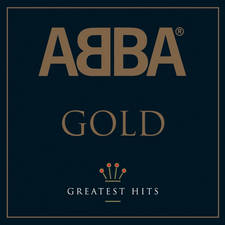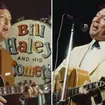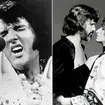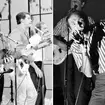Marvin Gaye's 15 greatest songs, ranked
24 April 2024, 17:05
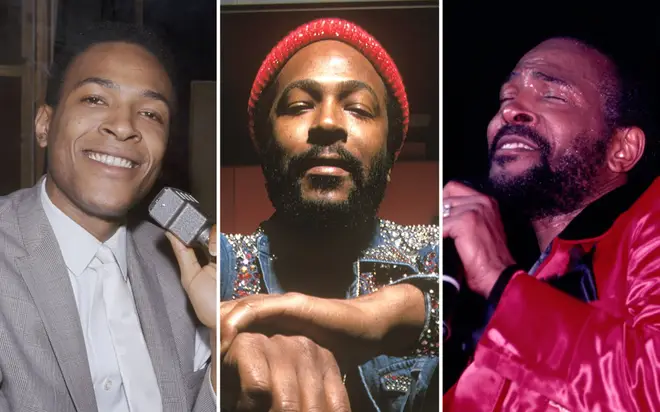
Listen to this article
His voice put Motown on the map.
But Marvin Gaye became so much more than the record label he helped define, firstly as a session player and then as a star himself.
The 'Prince of Motown' or the 'Prince of Soul', however you want to refer to Gaye, he was undeniably one of the most influential singers of the 20th century.
Having established Berry Gordy's hit-making machine during the sixties, Marvin moved on in an unprecedented breakaway from the label, carving out a career as a soul singer with both sexual and socio-political prowess.
- How did Marvin Gaye die? Inside the late soul music legend's tragic death
- When Stevie Wonder, Diana Ross, Marvin Gaye and more paid an all-star tribute to a late Motown legend
- A Marvin Gaye musical biopic with the full backing of Motown is in the works
- Motown's top 20 songs, ranked
Though his albums throughout the seventies and early eighties failed to receive the requisite recognition at the time - Gaye's first two Grammy Award wins came in 1983 for his final album, Midnight Love - some are regarded as masterpieces in retrospect.
Tragically, in one of the most shocking incidents in modern music, Marvin Gaye was shot dead by his father a day before his 45th birthday on 1st April 1984, silencing a voice that meant so much to so many.
Marvin's voice lives on through his music, and to prove the timeless quality of his work, we've ranked his 15 greatest songs:
-
'How Sweet It Is’ (To Be Loved By You)'

How Sweet It Is (To Be Loved By You)
Marvin Gaye's second top ten hit under Motown was written by the label's songwriters Brian Holland, Lamont Dozier and Eddie Holland.
Riffing off the "how sweet it is!" catchphrase of television's biggest stars in Jackie Gleason, 'How Sweet It Is To Be Loved By You' established Gaye as a standalone talent.
One of Gaye's most saccharine songs, James Taylor recorded his own sugary rendition a decade later with his then-wife Carly Simon, bagging himself a top five hit in the US.
Oddly, Marvin also released a German-language version of the song entitled 'Wie Schön Das Ist'.
-
'It Takes Two' with Kim Weston

It Takes Two
By 1966, Marvin was on his way to becoming a household name thanks to his series of hits on Motown.
However, he wasn't at all known overseas, which all changed with the release of the duet 'It Takes Two' with Kim Weston, which was written by her then-husband William "Mickey" Stevenson, and Sylvia Moy.
The soulful ditty made the top 20 of both the UK and US charts, becoming part of popular vernacular at the same time.
In 1990, Rod Stewart teamed up with Tina Turner for their own cover version which fared better in the UK, reaching number five.
-
'A Funky Space Reincarnation'

A Funky Space Reincarnation
Embroiled in a bitter divorce from his first wife Anna Gordy Gaye, Marvin began experimenting with sci-fi-indebted funk throughout the late seventies, the result of which was his 1978 album, Here, My Dear.
Taking cues from the likes of Parliament-Funkadelic and Earth, Wind & Fire, Gaye started to let loose and explore more with his arrangements.
One of the album's highlights is 'A Funky Space Reincarnation', an 8-minute funk odyssey where Marvin meets a woman who resembles Anna, who was evidently haunting him at the time. He later revealed he "sang and sang until I drained myself of everything I'd lived through."
'A Funky Space Reincarnation' received a modest charting upon its initial release, but the album has been reappraised as one of Marvin's most ambitious in the years since his death.
-
'Ain’t Nothing Like The Real Thing' with Tammi Terrell

Ain't Nothing Like The Real Thing
Marvin and Tammi Terrell had a unique chemistry, whose voices interweaved beautifully.
No wonder they made two albums together, the second of which was 1968's You're All I Need on Tamla, Motown's subsidiary label.
The first single, 'Ain't Nothing Like The Real' thing was an instant hit, scoring the pair the first of their two number one hits together.
Siblings Donny and Marie Osmond achieved a modest hit with their cover version in 1976, but lacks the same kind of wide-eyed romance that Gaye and Terrell effortlessly delivered.
-
'You’re All I Need To Get By' with Tammi Terrell

Marvin Gaye, Tammi Terrell - You're All I Need To Get By (Lyric Video)
Tammi was very much Marvin's creative foil during this period of their careers, editing out the backing vocals in the mix of their recordings because their voices worked so superbly together.
'You’re All I Need To Get By' was a prime example, despite not following the "Motown sound" the label had established, rather focusing on a more gospel feel.
A top 20 hit in the UK and top ten hit in the US after its 1968 release, Johnny Mathis would also try his luck with Deniece Williams on their cover of the song a decade later.
Tragically, 'You’re All I Need To Get By' came from the final of two albums Gaye and Terrell fully collaborated on together, as she died of a brain tumour in 1970 at the age of just 24.
-
'I Want You'

I Want You
Marvin Gaye never shied away from showing his sexual desire in his music, especially toward the latter stages of his career. Case-and-point in 'I Want You'.
Though penned by Motown writer Leon Ware, his seductive vocal delivery on the title track from his 1976 album of the same name was inspired by his relationship with teenager Janis Hunter.
He'd met Janis two years earlier when he was still married to Berry Gordy's sister Anna, and they later had two children together, though ended their tumultuous marriage just two years after they wed, splitting in 1979 and officially divorcing in 1982.
A number R&B hit, 'I Want You' missed out to Stevie Wonder's 'I Wish' for the Best R&B Male Vocal Performance Grammy Award, who pipped Gaye to the post two years prior with 'Superstition' too.
-
'Mercy Mercy Me (The Ecology)'

Marvin Gaye - Mercy Mercy Me (The Ecology) (Visualizer)
Years and years before global warming became part of the mainstream vocabulary, Marvin Gaye was writing songs with the environment at its heart.
Take 'Mercy Mercy Me (The Ecology)' for instance, though the song irked Berry Gordy as Gaye veered away from singing solely about love, exploring deeper social themes instead.
That's precisely why his 1971 album What's Going On endures as one of his most influential works, Gaye's commitment to environmentalism is clear as day.
He even claimed in a 1976 interview: "I would love to quit show business and go after that knowledge and that power that the truly gifted sorcerer has. The power's here, it's in the rocks, it's in the air, it's in the animals."
-
'Inner City Blues (Make Me Wanna Holler)'

Marvin Gaye - Inner City Blues (Make Me Wanna Holler)
Having distanced himself from the lovey-dovey ballads that helped establish him as a singer, Gaye began to explore his own socio-political consciousness and background as a black man in America.
Before moving to Detroit in 1960, Marvin grew up in Washington, DC. In poverty. It was his own experience he was unveiling and understanding.
'Inner City Blues (Makes Me Wanna Holler)' delves into the struggle of urban ghettos, poverty and homelessness, with Gaye's smooth, signature falsetto and compassionate viewpoint.
Another number one hit for Marvin in 1971, the third single from What's Going On was also the album's final track, capping off a visionary effort with as much poignancy as it began.
-
'Trouble Man'

Trouble Man
"There's only three things that's for sure. Taxes, death and trouble," Marvin coos on 'Trouble Man', the theme for the 1972 film of the same name.
Following in the footsteps of Curtis Mayfield and Isaac Hayes, who made the successful soundtracks to Superfly and Shaft respectively, Marvin had a crack at writing his own score for a blaxploitation movie.
The first album of Gaye's to be solely written and produced himself, he'd firmly established himself as an artist of the seventies, leaving behind his squeaky clean image in favour of grittier, contemporary subject matter.
'Trouble Man' was a top ten hit, and its superb soundtrack is undoubtedly the only reason the film is remembered.
-
'Got To Give It Up'

Marvin Gaye's Got To Give It Up PT. 1 Is A Classic!
Marvin waltzed right to the centre of the disco dance floor with his 1977 hip-shaker 'Got To Give It Up', as well as the top of the US Billboard charts, knocking off Fleetwood Mac's 'Dreams' in the process.
Under pressure to record more disco-indebted songs with the advent of the genre, Gaye had fun with it, creating a song made for parties which sounded like a party in of itself - note the chatter in the studio mix.
Originally a 12-minute song, it was cut to four minutes before striding up the charts, in what is one of his most joyous efforts.
'Got To Give It Up' was also the subject of a lawsuit between the Gaye estate and the writers of Robin Thicke's 2013 single 'Blurred Lines', who were deemed to have ripped off Marvin's number according to the courts, awarding Gaye's family $7.3 million in damages.
-
'Ain’t No Mountain High Enough' with Tammi Ferrell

Ain't No Mountain High Enough (extra HQ) - Marvin Gaye & Tammi Terrell
A truly seminal soul duet, 'Ain't No Mountain High Enough' is a song that everyone knows, and everybody loves.
Written by Motown's husband-and-wife songwriting duo Nick Ashford and Valerie Simpson, the ode to overcoming any obstacles was written by Ashford having struggled to make headway living in New York City, who wrote the song to inspire himself.
Whilst Marvin and Tammi's duet is no doubt the definitive version, Diana Ross' cover two years later propelled her to solo superstardom so has extra close ties to Motown alumni.
Quite ironically and cruelly, Diana's second husband Arne Næss, Jr. died in 2004 while climbing a mountain.
-
'Let’s Get It On'

Marvin Gaye - Let's Get It On
The song that marked Marvin Gaye's full transition into star-crossed, baby-making music: 'Let's Get It On'.
A re-write of Ed Townsend's 1958 single 'For Your Love', Marvin reworked the song's lyrics to fit his current infatuation with Janis Hunter, who'd later become his second wife.
The title track from his lauded album saw Gaye promote the perspective of sex and romance being a healing act, rather than sinful, in response to his harsh and faith-first upbringing by his father, Marvin Gay Snr.
Released in 1973, 'Let's Get It On' became Motown's most successful ever release at the time, hitting number one in the US Billboard charts and staying there for two weeks.
-
'Sexual Healing'

Marvin Gaye - Sexual Healing (Official HD Video)
If Marvin believed sex was a healing at, he could've have been any more blunt about in his now-classic love-making anthem 'Sexual Healing'.
The song came after a self-imposed exile in Belgium where Gaye got clean, got himself together, and revitalised his creativity in the wake of diminishing returns, at least where the critics were concerned.
Reportedly inspired by writer David Ritz who commented Gaye needed some "sexual healing", the lyrics inspired a song which became the fulcrum of Marvin's 1982 comeback album, Midnight Love.
His first single release post-Motown, 'Sexual Healing' became a major hit for Marvin, reaching the top of the charts in the US and Canada, the top five in the UK, and bagged him two Grammy Awards.
-
'What’s Going On'

Marvin Gaye - What's Going On (Official Video 2019)
Marvin seldom took part in the songwriting process, but that changed for his celebrated 1971 album What's Going On, as he wanted to establish himself as a meaningful artist. He succeeded.
Tackling subjects such as environmentalism, poverty, injustice, and disillusionment, Gaye used the title track to address the horrifying stories his brother Frankie told him after returning from the Vietnam War.
After the death of his friend and collaborator Tammi Terrell, Gaye strived to take more control of his career and incorporate deeper messaging in his music. Though his boss Berry Gordy called 'What's Going On' the "worst record I ever heard in my life."
Ignoring Gordy's criticism, Gaye went forward with the single release which proved to be a masterstroke, reaching number two on the US Billboard Hot 100 and number one on the R&B chart.
The first political statement a Motown artist had made, Jackson Browne reflected on its impact in a 2008 interview with Rolling Stone:
"No one was expecting an anti-war song from him. But it was a moment in time when people were willing to hear it from anybody if it was heartfelt. And who better than the person who has talked to you about love and desire?"
-
'I Heard It Through The Grapevine'

Marvin Gaye - I Heard It Through The Grapevine (Lyric Video)
Detailing heartbreak and betrayal like no other song in the history of soul music, 'I Heard It Through The Grapevine' is undoubtedly Marvin Gaye's greatest, and most beloved achievement.
Despite being synonymous with the sultry singer however, the song was recorded by Smokey Robinson and the Miracles, the Isley Brothers, and Gladys Knight before it made its way to Marvin.
A song where a man laments finding out that his lover cheating on him, Gaye was instructed to pour every ounce of emotion into his delivery by producer Norman Whitfield who also wrote the song.
Marvin told NME: "I simply took direction, as I felt the direction he was expounding was a proper one. Had I done it myself I would not have sung it at all like that, but y'see there are many benefits in just singing other people's material and taking directions. The job of interpreting is quite an important one, because when people are not able to express what is in their souls if there is an artist who can... then I think that is very valuable."
Reaching number one on both the UK and US charts, 'I Heard It Through The Grapevine' was Motown's biggest hit at that point, until it was bested by Lionel Richie and Diana Ross's duet 'Endless Love' in 1981.
Creedence Clearwater Revival even covered it, given the song's far-reaching, heart-wrenching appeal.
Nevertheless, it's undoubtedly Marvin Gaye's signature hit, one that endears itself to lonely hearts and lost lovers, each and every time it's played.
